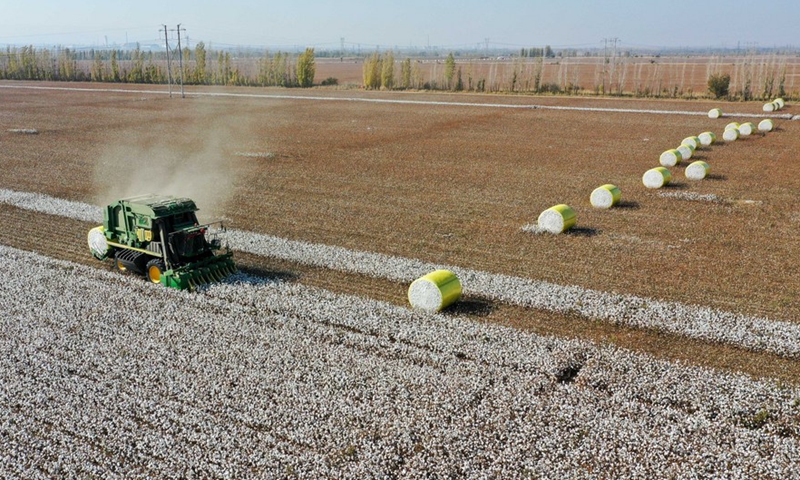
Photo:Xinhua
Xinjiang cotton has become the center of Chinese public opinion. Some Western companies, including H&M and Nike, which announced a boycott of Xinjiang cotton last year, have been denounced by Chinese netizens. US and the West's joint sanctions on China over Xinjiang-related affairs and China's countermeasures have intensified the sentiments on both sides, raising the temperature of the matter. The escalation of the confrontation over Xinjiang may have just begun. Chinese people need to see the essence of the struggle, get to know how the US will fight this battle, and make plans over how to crash US wishful thinking.
Xinjiang is one of the hot-spot issues in the China-US competition. In the eyes of the US, Xinjiang-related topics can be mostly exploited and result in greatest political benefits. Since taking office, regardless of China's strong opposition, the Biden administration has picked up the term "genocide," which was forcibly created by former US secretary of State Mike Pompeo in the last days of his tenure. Worse, the Biden administration has attempted to formalize the label, and pushed its allies to use it. We should maintain high vigilance against Washington's sinister intentions.
The US has ganged up with its European allies on Xinjiang affairs, which marks an initial gain in Biden administration's tactic to deal with China jointly with its allies. But their ambition is much higher than this. Their ultimate goal is to make the label of "genocide" be accepted by the vast number of developing countries, especially the Islamic world, inciting confrontation between China and Islamic countries and turning such confrontation into a major external issue of Muslim nations, and dilute the long-term confrontation of civilizations between those countries and the West.
This is, of course, a self-flattered goal that can never be achieved. Washington arrogantly believes that they are capable of doing anything, and they will then seize every possible opportunity to expand their anti-Xinjiang front to make a fast buck. The "battlefield" over Xinjiang issue may be further highlighted in the ideological conflicts between China and the US, and become the frontline battlefield.
The current focus of the US is to broaden and deepen its mobilization in the West over Xinjiang affairs. It is attempting to draw in as many countries and companies as possible to sanction Xinjiang, instigate the fermentation of the "genocide" label, making it everywhere in Western political discourse on China, and turning it into a culture-related issue. It wants to tattoo the groundless accusation on China's face.
The US' next step is to mobilize the soft power of the West to influence the views of developing countries, especially Islamic countries, on the situation in Xinjiang through various channels to extend the attack on China beyond the realm of a diplomatic struggle. By putting pressure on the government through the civil influence of some Muslim countries, the US will then undermine China's good relations with those countries and create uncertainties.
All this will test China's comprehensive ability to respond. We must let the world understand real situation in Xinjiang. Compared with other topics, there are more hard indicators on whether there is "forced labor" in Xinjiang, which is the best way for China to refute the slander of the US and the West. We can prove to the world that Xinjiang produces the best-quality cotton in the world, and the production there meets all the standards of human rights and morality.
In this sense, many Western clothing giants have expressed their position to cut off their connection with Xinjiang's cotton, which is unfavorable for our interests. But the attempt to change their attitude, urging the Better Cotton Initiative to redefine Xinjiang's cotton, will become our realistic leverage to win the battle.
Staying away from political disputes is the common motto of multinational companies. Those Western clothing companies have broken the taboo by participating in sanctions against Xinjiang. The US has pressured these companies to politicize Xinjiang cotton, which is completely against the values shared by the global business community. Considering the expanding attractiveness of the Chinese market, we are by no means as powerless and passive in this battle as some people imagine.
We believe Chinese netizens have the right to expose past and current offenses those companies have made under Washington's pressure, and make them pay the price through the market. We also suggest that China should be more strategic as a whole, showing its strength and attractiveness and promote changes in the situation that are more favorable to us.
Xinjiang's governance is based on our goodwill to maintain local peace and prosperity. Xinjiang's cotton is related to the well-being of all people in Xinjiang. We have facts and morality on our side, and we should have full confidence in winning the battle. Let us mobilize various forces, give full play to their specific strengths and fight a people's war to safeguard our sovereignty and dignity creatively.




